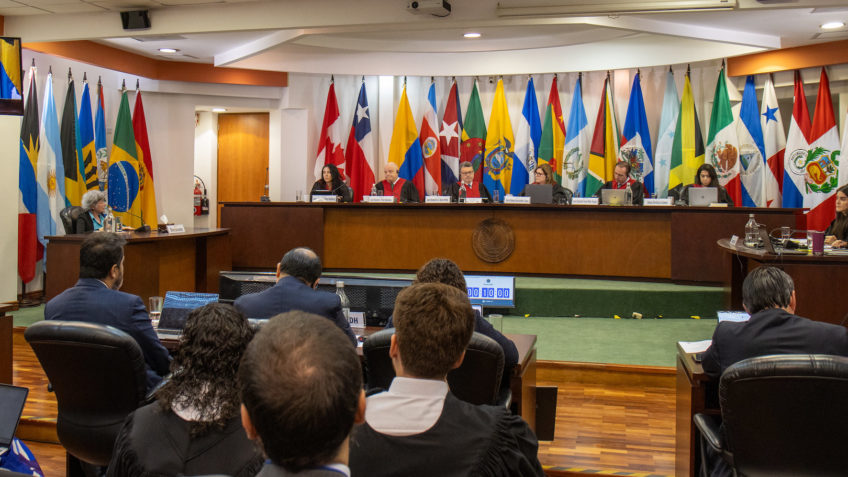
More onerous rules on prescription are non-retroactive, and the most beneficial ones must be retroactive to favor people, writes Fábio Medina Osório
A IACHR (Inter-American Court of Human Rights) plays a crucial role in the protection of human rights in the American continent.
One of the relevant topics in the case law of the Inter-American Court of Human Rights is the issue of the retroactivity of prescription in matters of administrative sanctioning law.
The statute of limitations in administrative sanctioning law refers to the time limit within which the public administration or the Judiciary may apply sanctions for infractions committed under the administrative sanctioning law regime. After this period, the State’s right to punish is extinguished, providing legal certainty to those administered or under its jurisdiction.
The concept of administrative sanction that we have defended since 1999 and that was adopted in the reform of the law is adopted here. 8.429/1992according to which the sanctioning power belongs to both the Judiciary and the public administration, but must be exercised under the legal regime of administrative law.
Principle of non-retroactivity of law
The principle of non-retroactivity of the law is a fundamental pillar of criminal and administrative sanctioning law, ensuring that a person cannot be punished for acts that were not considered infractions at the time they were committed or if the limitation periods have already been reached.
This principle is enshrined in several conventions and several international human rights treaties, including the American Convention on Human Rights. Furthermore, the most beneficial laws regarding prescription are retroactive, since in the field of criminal law and administrative sanctioning law, prescription is connected to substantive law. In this sense, we defend this position in the doctrine.
Below, I list some case law from the Inter-American Court of Human Rights:
- Gelman v. Uruguay Case (2011)
Context: this case involved the interpretation of amnesty laws and the statute of limitations for crimes committed during dictatorial regimes.
Decision: The Inter-American Court of Human Rights has emphasized that the retroactive application of laws that benefit defendants (decriminalization or reduction of sentences) is permitted, but never in the opposite direction, to the detriment of them. The Court reaffirmed that the statute of limitations cannot be retroactive to the detriment of the accused, establishing that “amnesty provisions, statute of limitations provisions and the establishment of exclusions of liability are inadmissible, which seek to prevent the investigation and punishment of those responsible for serious human rights violations, such as torture, summary, extrajudicial or arbitrary executions, and enforced disappearances, all of which are prohibited, as they violate inderogable rights recognized by international human rights law”.
- Baena Ricardo et al. vs. Panama (2001)
Context: this case arose from the dismissal of 270 civil servants in Panama following the US military intervention. The dismissals were criticized as being politically motivated, with arguments that they were intended to exclude supporters of General Manuel Noriega from public service.
Decision: The Inter-American Court of Human Rights concluded that Panama violated the fundamental rights of the dismissed workers, including the right to freedom of association and work, as well as access to effective judicial protection. The Court determined that the dismissals were arbitrary and lacked due process, resulting in violations of Articles 8, 16 and 25 of the American Convention on Human Rights. This judgment reinforces the importance of due process and the protection of workers’ rights in post-conflict contexts. The following excerpts from the decision stand out:
“Justice, administered through due process of law, as a true legally protected value, must be guaranteed in all disciplinary proceedings, and States cannot exempt themselves from this obligation by arguing that the due guarantees of Article 8 of the American Convention do not apply in the case of disciplinary and non-criminal sanctions. Allowing States to interpret this would be tantamount to leaving it up to their free will to decide whether or not to apply the right of every person to due process. […]
“The victims in this case were not subjected to an administrative procedure prior to the sanction of dismissal. The President of the Republic [do Panamá] determined that there was a link between the strike of state workers and the movement of Colonel Eduardo Herrera Hassán and, based on this, ordered that the workers who had participated in this strike be dismissed, presuming their guilt. Furthermore, the method used to determine who had participated in the organization, call or execution of the national strike held on December 5, 1990, that is, the identification of the accused by the leader of each institution, using in some cases ‘reports’ prepared by various heads of the entity, meant that the workers were denied a formal process prior to dismissal.
“Once the employee who had allegedly violated the rule was identified, he was dismissed by means of a letter, without allowing him to present arguments and evidence in his defense. Once the sanction was imposed, the public employee could request that it be reconsidered by the same authority that had dismissed him, as well as appeal to the hierarchical superior of that authority. However, the evidence in this case shows that not all of the appeals filed were even responded to, which implies a violation of the right to appeal.”
“It is clear to the Court that the dismissals, carried out without the guarantees of Article 8 of the Convention, had serious socioeconomic consequences for the dismissed workers, their families and dependents, such as loss of income and a reduction in their standard of living. There is no doubt that, when applying a sanction with such serious consequences, the State should guarantee the worker due process with the guarantees provided for in the American Convention.”
- Case of Barrios Altos vs. Peru (2001)
Context: the case involved the application of amnesty laws in Peru that prevented the investigation and punishment of those responsible for the Barrios Altos massacrein November 1991.
Decision: The Inter-American Court of Human Rights has ruled that amnesty laws that impede the investigation and punishment of serious human rights violations are incompatible with the American Convention on Human Rights. Although the case does not directly address the issue of prescription, it establishes an important precedent on the inapplicability of rules that obstruct justice, and can be interpreted as a reference for the application of more favorable rules.
Imprescriptibility
As can be seen from the case law of the Inter-American Court of Human Rights, the statute of limitations is non-retroactive in cases where it was enshrined to benefit perpetrators of crimes against human rights, such as torture, genocide and other similar crimes, generally committed in dictatorial regimes.
In fact, as is the case in Brazil, these crimes are considered imprescriptible, in light of the jurisprudence of the Inter-American Court of Human Rights.
Implications of the case law of the Inter-American Court of Human Rights in the field of administrative law
In August 2022, the STF judged the general repercussion theme 1,199, in which it also considered the theme related to the prescription provided for in article 23 of the law 14.230/2021. At that time, the Supreme Court decided that the new prescriptive regime provided for in the legislation was non-retroactive, with the new time frames applying from the publication of the law.
Prescription is an institute of material law, within the scope of sanctioning administrative law, subject to the principle of retroactivity of the most benign norms – a thesis, in fact, supported by the STF itself in relation to administrative improbity within the scope of the general repercussion of theme 1,199.
As is well known, the Inter-American Court has precedents to the effect that certain rules, even those relating to the statute of limitations, are non-retroactive when it comes to protecting the fundamental rights of victims of torture or similar crimes (La Cantuta v. Peru case, 2006; Albán Cornejo et al. v. Ecuador case, 2007), but this thesis should be viewed restrictively. In general, the Court enshrines the retroactivity of criminal and administrative sanctioning law rules in matters of typicality, legality and culpability, in accordance with the established case law of that court (Baena Ricardo y otros v. Panama case, 2021; Maldonado Ordoñez v. Guatemala case, 2023).
It should be noted that Law 14,230/2021, which introduced the reform to Law 8,429/1992, defined that the rules and principles of administrative sanctioning law apply to the legal regime of administrative misconduct. In this sense, the guidance adopted by the Supreme Federal Court in general repercussion 1,199 contravened the case law of the Inter-American Court of Human Rights, insofar as it did not recognize the retroactivity of the new prescriptive regime provided for in Law 14,230/2021.
Implications of the case law of the Inter-American Court of Human Rights
- legal certainty: on the contrary, more beneficial changes in terms of prescriptive regimes must be welcomed to benefit people, since these are substantive law standards, which impact the State’s punitive intention;
- to legality: in this sense, the right to the most favorable prescriptive rule arises from the right to legality, according to the settled case law of the Inter-American Court of Human Rights;
- protection of human rights: the decisions of the Inter-American Court of Human Rights ensure that human rights, including the right to a fair trial and the rule of law, are protected against abuses of state power;
- limitations on the punitive power of the State: the Inter-American Court establishes clear limits to the State’s punitive power, avoiding the arbitrary and retroactive application of sanctions.
Conclusion
In short, prescription is an institute of substantive law, both in the field of criminal law and in the field of administrative sanctioning law. In this sense, more onerous rules in terms of prescription are non-retroactive, and more beneficial rules must be retroactive to favor individuals.
The exceptions to the retroactivity of the most beneficial prescription are based on the clauses that typify crimes against humanity and human rights, often because they are imprescriptible crimes, but also because of the more rigorous protection of victims’ rights.
Source: https://www.poder360.com.br/opiniao/a-corte-idh-e-a-retroatividade-no-direito-administrativo-sancionador/

